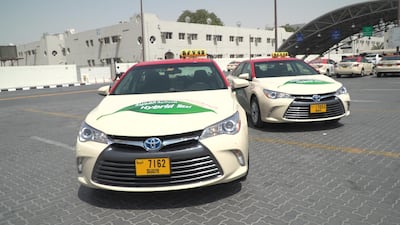Dubai’s Road and Transport Authority has endorsed a contract for procuring 554 environment-friendly hybrid vehicles.
These vehicles, which are fitted with a combination of fuel engine and electric motors, make up about 11 per cent the Dubai Taxi Corporation’s fleet.
The move is part of a plan to curb pollution from exhausts and make vehicles friendly to the environment of Dubai, reported state news agency Wam.
DTC plans to increase the proportion of hybrid vehicles to 17 per cent of its taxi fleet, which currently comprises 503 vehicles, by year end.
Mattar Al Tayer, Director-General and Chairman of the Board of Executive Directors of the RTA, said the move illustrated the RTA’s commitment to curbing carbon emissions from the taxi by 2 per cent - as required by the Dubai Supreme Council of Energy and the Green Economy initiative.
"The underlying objective of using hybrid vehicles operation is to support Dubai’s initiative themed ‘Green Vehicles for a Cleaner Environment,’ besides assessing the feasibility of using hybrid vehicles in the Dubai Taxi fleet.”
He said the RTA is the first government entity in the region to experiment with the operation of hybrid taxicabs fitted with electric-fuel engines in Dubai taxi from 2008 to 2011.
“Results of the experiment revealed that such vehicles had covered 550,000 kilometres without faults or requiring maintenance of major parts. Fuel efficiency reached 30 percent and carbon emission dropped by 30 percent as well," said Mr Al Tayer.
The RTA had endorsed a plan for converting 50 percent of Dubai taxicabs into hybrid vehicles by 2021.

